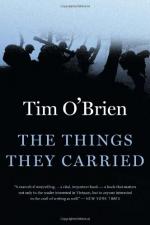|
|
The Things They Carried Notes & Analysis
The free The Things They Carried notes include comprehensive information and analysis to help you understand the book. These free notes consist of about 54 pages (16,016 words) and contain the following sections:
These free notes also contain Quotes and Themes & Topics on The Things They Carried by Tim O'Brien.
The Things They Carried Plot Summary
Lieutenant Jimmy Cross' platoon of soldiers are a group of very young men, most of whom are unprepared for the Vietnam War. They carry heavy rations and supplies, and pictures of their girlfriends, and fear and sadness and confusion. They often pretend that they do not feel as much as they do, because they don't want to look silly to the other soldiers. Jimmy Cross loves a girl named Martha who he knows will never love him back, and he continues to love her long after the war ends. The men do sometimes reveal their emotions, in heartfelt or comical ways. Tim O'Brien, the narrator, writes stories about his friends in his platoon. Mitchell Sanders mails lice he removes from his body to his draft board in Ohio. But there are many terrible memories Tim can't shake. He watched a man get blown up by a mine. He saw young men get hardened by grief and anger and injustice. He remembers believing the war was wrong, and wanting to run away to Canada. He even tries to go, and spends six days in a lodge at the border, but in the end he is too afraid of what his family and friends will think if he doesn't fight. He went to war, he says, because he was a coward.
Strange things happen to soldiers in Vietnam: they get paranoid, and they lose their sense of morality and justice. They become hardened and angry, because no one back home understands what they are going through. After his best friend dies, Rat Kiley, a medic, writes a letter to the friend's sister, telling her what a wonderful man her brother was. The sister never writes back, and Rat's grief turns to hard anger. Tim explains that this is a true war story, because there is no moral, only ugliness and cruelty. One particularly strange story Tim heard from Rat Kiley: a soldier brought his girlfriend to Vietnam. She arrived fresh-faced and very young, but she quickly became absorbed into life in the jungle. Gradually she lost all of her attachment to her old life. She disappeared into the jungle. The soldiers understand this story, because they believe there is magic in Vietnam. Superstitions are real, and the truth is relative. There are moments and feelings that Tim cannot forget. One of them is of the man he killed: a young Vietnamese soldier who was walking down a trail when Tim threw a grenade at him. Tim will never forget the man's exploded face. Nor will he lose the image of a young girl dancing outside of her destroyed village, as American soldiers carry her dead family away.
Norman Bowker, one of Tim's friends and fellow soldiers, returns from the war unsure of what to do with all his terrible knowledge and memories. He finds he can't talk to anyone--no one will listen, or could understand if they did listen--and everything he does seems silly and irrelevant. He eventually kills himself. Tim tells Norman's story to try to do his life justice.
After one of the best men in their company dies in a night attack, the men search for him in the mud. Each of them feels somehow to blame. The narrator-Tim explains that all these stories are made up, but they are true anyway, because they explain what Vietnam was like. Besides, Vietnam makes it difficult to know just what is true: Am I to blame for the death of this man? Each soldier asks this question, but there are no answers. Twenty years later, Tim brings his young daughter to the riverbank and buries his friend's shoes in the mud. He doesn't know what to feel.
Tim was shot twice: the first time he was taken care of by a good medic, but the second time, the medic was inexperienced and Tim nearly died. Tim gets revenge: he pretends to be the enemy one night when the medic is on watch. He later hates himself for doing this, but he feels close to the man, because he watches him cower in fear, just as Tim did when he was shot and thought he was dying.
Rat Kiley lost his mind in the field. He thought bugs were trying to kill him. When he shoots himself in the foot so he can leave the field, no one blames him. He was a good soldier, but combat was eventually too much for him.
Tim knows that stories can bring the dead back to life. Telling stories about people can make you feel like they're there with you. The soldiers do this so that they don't have to think about the fact that their friends are actually dead, or that they just killed a real person. Tim has been doing it since he was a child, when the first girl he ever loved died of a brain tumor. The stories change--names, dates, and even events transform--but the memories are kept alive by the storyteller.




